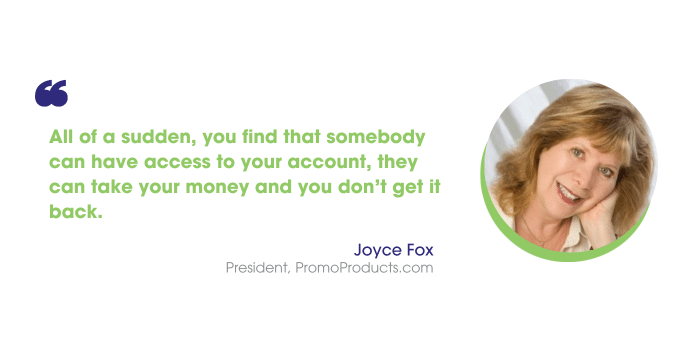The couple behind a Sarasota, Florida-based distributorship is experiencing a nightmare after thieves allegedly hacked into their bank account and stole $10,000.
Joyce and Stan Fox, president and senior vice president of PromoProducts.com, a division of Promo World (PPAI 454996, Standard-Plus), say Truist Bank notified them in February that someone was trying to use their business account to Zelle themselves money, WFLA News reported.
After their account was frozen and they went to the bank to sort things out, they learned that a $20,000 transaction was successfully stopped, but a $10,000 transaction still went through, the couple says.
No Solution
Four months later, the Foxes say that their bank has notified them that they aren’t getting their money back because Truist has been unsuccessful in retrieving it.
“All of a sudden, you find that somebody can have access to your account, they can take your money and you don’t get it back,” Joyce, a 40-year veteran of the promotional products industry, told WFLA News. “It’s unheard of to me. It’s unfathomable to me.”

Despite electronic transfers typically requiring her PIN for authorization, Joyce says that she wasn’t notified of the pending transaction and that it occurred when the account was supposed to be on hold.
“They took it out without our permission,” she said. “I don’t understand how they can justify not giving us the money back just because they didn’t get the money back. We didn’t tell them to pay anybody.”
- According to a consumer watchdog with the Public Interest Research Group (PIRG), this situation should fall under the Electronic Fund Transfer Act and that the Foxes should be able to get their funds back.
‘A Huge Amount’
According to Joyce, $5,000 of the stolen money was allocated for sales tax and payroll tax that the couple still owe the government. “That’s a huge amount of money,” she said.
A Truist spokeswoman sent this statement to WFLA News: “At Truist, protecting our clients and their accounts continues to be a top priority and we take any potential fraud concerns seriously.
All financial institutions across the country are experiencing escalated fraud attacks from criminals. The Federal Trade Commission recently reported that consumers lost nearly $10 billion to fraud in 2023, an increase of more than 14% over the previous year.
RELATED: Cybersecurity: Big Business’s No. 1 Vendor Priority
“This is why Truist continues to diligently educate our clients on the current fraud schemes and how to protect their identity and immediately report instances where they believe their identity has been compromised. We also provide tools, tips and resources on our website that consumers can visit to learn more.”
Protect Yourself
As both an individual consumer and a promotional products business, you’re likely to be targeted by scams involving app-based payment methods or actual hacks into banking accounts.
Although most of these attempts will fail, it takes only one successful attempt to potentially cost your company thousands of dollars.
RELATED: How A Connecticut Distributor Knew She Was Being Scammed
BeenVerified, a website dedicated to helping citizens understand how to use public data, provides some catch-all advice to avoid the most common tactics.
- Do not reply to messages: Any concerns should be addressed by looking up the number of the company and calling directly.
- Do not click links: Ransomware or malicious software can enter your computer through links.
- Do not provide personal information: Every bit of information a criminal has will increase their chances of more intricate fraud and will maximize the attempts on your accounts.
- Do not give anyone outside your company remote access to your card.
- Be wary of anyone bringing up “gift cards”: This is the beginning point of a scam. If such an email comes from within your company, confirm with the sender in-person, via phone or in a separate email.


